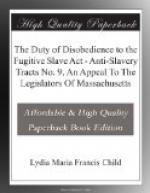Robert Rantoul, Jr., whose large heart was so true to Democratic principles, that the party wanted to expel him from their ranks, (as parties are prone to do with honest men,) opposed the Fugitive Slave Bill with all the power of his strong intellect. In a speech delivered in 1851, he said: “I am as devotedly attached as any other man to the Union of these States, and the Constitution of our government; but I admire and love them for that which they secure to us. The Constitution is good, and great, and valuable, and to be held for ever sacred, because it secures to us what was the object of the Constitution. I love the Union and the Constitution, not for themselves, but for the great end for which they were created—to secure and perpetuate liberty; not the liberty of a class, superimposed upon the thraldom of groaning multitudes: not the liberty of a ruling race, cemented by the tears and blood of subject races, but human liberty, perfect liberty, common to the whole people of the United States and to their posterity. It is because I believe all this, that I love the Union and the Constitution. If it were not for that, the Union would be valueless, and the Constitution not worth the parchment on which it is written. God-given Liberty is above the Union, and above the Constitution, and above all the works of man.”
* * * * *
TESTIMONIES AGAINST THE FUGITIVE SLAVE ACT.
The Hon. Josiah Quincy, senior, whose integrity, noble intellect, and long experience in public life, give great weight to his opinions, made a speech at a Whig Convention in Boston, 1854, from which I extract the following:—“The circumstances in which the people of Massachusetts are placed are undeniably insupportable. What has been seen, what has been felt, by every man, woman and child in this metropolis, and in this community? and virtually by every man, woman and child in Massachusetts? We have seen our Court House in chains, two battalions of dragoons, eight regiments of artillery, twelve companies of infantry, the whole constabulary force of the city police, the entire disposable marine of the United States, with its artillery loaded for action, all marching in support of a Praetorian Band, consisting of one hundred and twenty friends and associates of the U.S. Marshal, with loaded pistols and drawn swords, and in military costume and array; and for what purpose? To escort and conduct a poor trembling slave from a Boston Court House to the fetters and lash of his master!
“This scene, thus awful, thus detestable, every inhabitant of this metropolis, nay, every inhabitant of this Commonwealth, may be compelled again to witness, at any time, and every day in the year, at the will or the whim of the meanest and basest slaveholder of the South. Is there a man in Massachusetts with a spirit so low, so debased, so corrupted by his fears, or his fortune, that he is prepared to say this is a condition of things to be endured in perpetuity by us? and that this is an inheritance to be transmitted by us to our children, for all generations? For so long as the fugitive-slave clause remains in the Constitution, unobliterated, it is an obligation perpetual upon them, as well as upon us.




